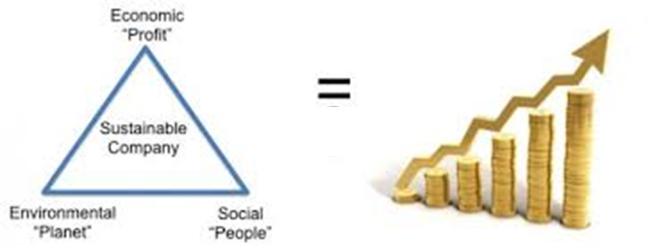Whether you aspire to be an entrepreneur, finance professional, consultant or business manager after Darden, understanding the sustainability perspective of value creation is critical because it is now shaping the business and investment world and will continue to do so for years to come.
Sustainable business is about creating a system of business capable of sustaining itself indefinitely while enhancing the quality of peoples’ lives. The definition of good business is increasingly aligned with sustainable economic development, which is a growth strategy designed to deliver high marks not just on profitability but also on other performance metrics such as ecological system protection, human health, social equity and community cohesion. Never before has the need for promulgating sustainable business practices been more important.
The world’s population will grow from 7.1 billion today to a staggering 9.5 billion by 2050. To feed 2.4 billion new mouths and deliver on the material and energy needs stemming from an increase in goods and services from $21 trillion to $56 trillion for an emerging global middle class requires that our ability to generate agricultural and industrial output increase dramatically. At the same time, resource use that neither permanently depletes existing natural capital nor overwhelms us with pollutants needs widespread adoption. However, companies that engage in sustainable business practices need not do so solely for the purpose of creating a better world, but can generate increased revenues and improved profitability as they create innovative products, services, and processes; gain access to new technologies and markets; engineer collaborative supply chain practices; and drive costs down through efficiency measures.
Darden provides several opportunities for students to learn about the field through courses on sustainability, innovation, and entrepreneurship as well as clubs such as Net Impact and the Emerging Markets Development Club.
While the adoption of sustainable business practices requires a different consciousness among business leaders, it also represents a unique opportunity for financial investors to capitalize on a new frontier of innovation. The precursor to sustainable investing was socially responsible investing which screened out “sin stocks” in the alcohol, tobacco and gambling industry. However, sustainable investing has evolved significantly since then. Today, in addition to these negative screens are rigorous positive, solution-focused criteria and the expectation that companies will outperform their competitors because of good financial, environmental, social and governance practices combined. An analysis of a company’s record on social issues reveals its true character and, we believe, is a significant indicator of its long-term financial viability. Data increasingly supports the proposition that companies with strong positive social and environmental policies often have lower turnover, higher productivity, better brand reputation and customer loyalty. On the governance front, characteristics such as transparency — to stakeholders and the public — and appreciation of the gains from employee diversity and ethical conduct throughout supply chains are associated with superior performance.
The $3 trillion in assets under management in sustainability-informed investment strategies (i.e. assets invested in companies with sustainable business practices) highlights that the process of alignment of investors’ goals with the concept of sustainability in business has begun in earnest.
Darden Capital Management’s Rotunda Fund manages close to a million dollars of Darden’s endowment by investing in companies with sustainable business practices.
However, sustainable investing is still not a mainstream investment philosophy. Dated assumptions that financial returns must be sacrificed if a firm seeks economic and social benefits for a broader set of stakeholders unfortunately are still prevalent. An increasing body of investment research, however, suggests that integrating economic, environmental and social considerations into traditional financial analysis offers investors a more comprehensive view of companies’ value creation potential and leads to better informed investment decisions. Thus, in our opinion, it is only a matter of time before sustainability metrics become a key part of any fundamental investment philosophy.
Never before has it been so important to position our futures with companies poised for long-term, sustainable growth. Many companies now employ sustainability frameworks and tools and as the overall business environment moves in this direction, business leaders in this field will benefit from early mover advantages and a wealth of institutional knowledge.
This article was co-authored by Andrea Larson, Associate Professor of Business Administration, and Rohan Poojara, a second-year student at Darden. Professor Larson teaches the Sustainable Innovation and Entrepreneurship course at Darden and Rohan Poojara is the Senior Portfolio Manager for the Rotunda Fund and a Vice President in the Net Impact and Emerging Markets Development Clubs.
Bibliography:
- Edward Kerschner and Naeema Huq, Asian Affluence: The Emerging 21st Century Middle Class, Morgan Stanley Smith Barney: http://www.morganstanleyfa.com/public/projectfiles/35257b34-b160-45e4-980d-8bca327db92b.pdf
- Lu, Y., Cui, Q., and Le, Y. (2013). ”Turning Green to Gold in the Construction Industry: Fable or Fact?.” J. Constr. Eng. Manage.,139(8), 1026–1036: http://ascelibrary.org/doi/abs/10.1061/%28ASCE%29CO.1943-7862.0000676
- Fujii, H., Iwata, K., Kaneko, S. and Managi, S. (2013), Corporate Environmental and Economic Performance of Japanese Manufacturing Firms: Empirical Study for Sustainable Development. Bus. Strat. Env., 22: 187–201. doi: 10.1002/bse.1747: http://onlinelibrary.wiley.com/doi/10.1002/bse.1747/abstract
- Morgan P. Miles, Jeffrey G. Covin, Environmental Marketing: A Source of Reputational, Competitive, and Financial Advantage, Journal of Business Ethics, 2000, Volume 23, Number 3, Page 299: http://link.springer.com/article/10.1023/A:1006214509281#page-1
- Judge, W. Q. and Douglas, T. J. (1998), Performance Implications of Incorporating Natural Environmental Issues into the Strategic Planning Process: An Empirical Assessment. Journal of Management Studies, 35: 241–262. doi: 10.1111/1467-6486.00092: http://onlinelibrary.wiley.com/doi/10.1111/1467-6486.00092/abstract?deniedAccessCustomisedMessage=&userIsAuthenticated=false
- Ba, S., Lisic, L. L., Liu, Q. and Stallaert, J. (2013), Stock Market Reaction to Green Vehicle Innovation. Production and Operations Management, 22: 976–990. doi: 10.1111/j.1937-5956.2012.01387.x: http://onlinelibrary.wiley.com/doi/10.1111/j.1937-5956.2012.01387.x/abstract;jsessionid=7656587692797E099355CACF24111CC0.f02t01
- Konaar, Shameek and Cohen, Mark Does the Market Value Environmental Performance? The Review of Economics and Statistics: http://www.mitpressjournals.org/doi/abs/10.1162/00346530151143815
- Nelson Areal, Maria Céu Cortez, Florinda Silva, The conditional performance of US mutual funds over different market regimes: do different types of ethical screens matter? Financial Markets and Portfolio Management December 2013, Volume 27, Issue 4, pp 397-429: http://link.springer.com/article/10.1007%2Fs11408-013-0218-5

